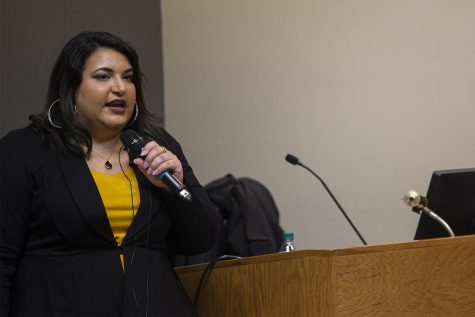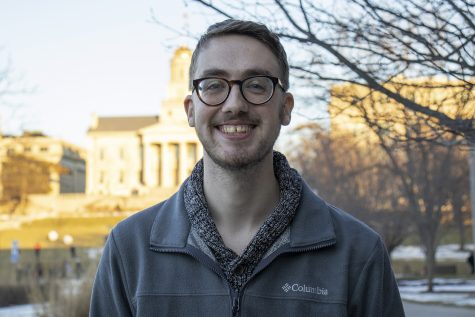UI professor’s opioid research evaluates link between opioid use and chronic pain
University of Iowa researcher Barbara St. Marie has focused her research on opioid misuse and substance abuse disorders and help clinicians treat patients for chronic pain.
February 10, 2020
As medical professionals in the U.S. face a growing concern surrounding the opioid crisis and seek ways to manage this problem, University of Iowa researchers are developing tools to combat the crisis.
UI nursing Assistant Professor Barbara St. Marie recently conducted research on opioid misuse and substance-abuse disorders by talking to patients being treated for chronic pain who have used opioids.
She began her research with a survey at a Methadone clinic in Minnesota, asking patients about their experience with chronic pain and opioid use, how their substance use disorder started, and how they had ended up at the clinic.
St. Marie asked patients what they felt would help reduce the tendency for them to develop, or not develop at all, an opioid use disorder following the treatment of their pain.
“What I found … there was a trajectory of their experiences, one being they actually had the disease of addiction prior to getting on something for their pain,” St. Marie said. “Then that led them to abuse not only the substance they were on, but also the additional substance they received for pain management.”
She also discovered a trajectory of patients who did not have substance-use disorder but had an injury where they were prescribed opioids for their pain, and then took more, St. Marie said.
RELATED: UI research professors receive $13 million to prevent opioid misuse
St. Marie received funding from the National Institute on Drug Abuse and has been developing a decision-support tool for health-care providers to make sure patients get the right diagnosis and to stratify the risk of somebody developing opioid-use disorder, she said.
The practices outlined in the support tool are evidence-based ways to look at nonmedicine modalities for pain, medications that are recommended for use based on risk gratification, and what the best way to monitor the patient would be, St. Marie said.
Keela Herr, St. Marie’s mentor and associate dean for faculty in the College of Nursing, oversees and helped St. Marie brainstorm for her research. St. Marie’s research looks at how to effectively manage pain and guide clinicians in making decisions regarding a patient’s pain management, Herr said.
“As everybody’s probably aware of, we have a crisis in our country related to opioid use and abuse and overdoses related to that,” Herr said. “But we also have an issue related to ineffectively managed chronic pain, with many millions of people that struggle with that problem as well.”
In 2017, there were 341 opioid overdose deaths in Iowa, with 70,237 deaths nationally that year, according to the Centers for Disease Control and Prevention.
There has been investigation into the development of new drugs that do not have the potential for addiction that opioids have, Herr said. Other research is looking into nonmedical ways to treat chronic pain such as exercise, massage, cold treatments, heat treatments, and Thai Chi, she added.
Steven Arndt, another of St. Marie’s mentors and former UI psychiatry professor, said the medical community does not use the term substance abuse anymore because it seems harmful. There is a problem across the country with opioid use and overdoses, and the negative social reaction has not been helpful, he said.
“There are ways of using opioids that are more safe than just handing out a gigantic bottle of them,” Arndt said. “I think sometimes people get an idea that a drug is bad because people react to it — we don’t do that with any other drug.”





















